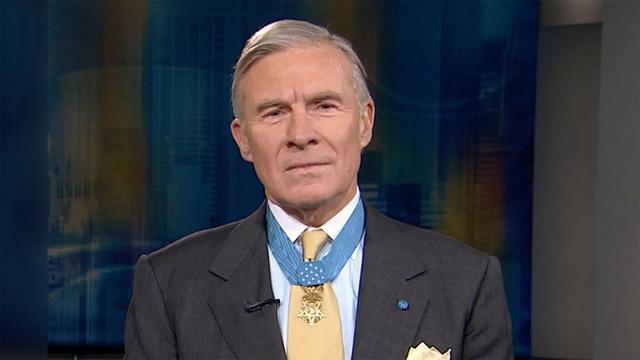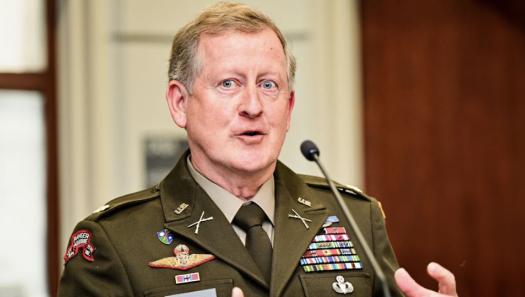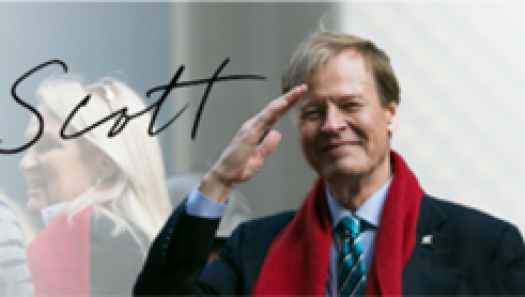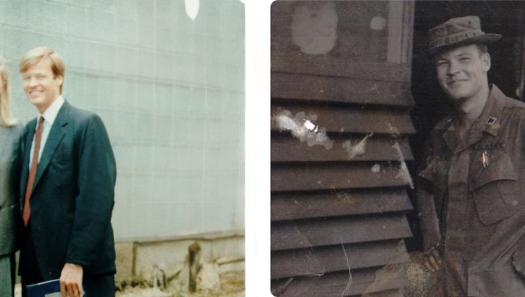WeSalute Awards
HeroVet: Paul W. Bucha, Army Brat

He was an Army brat, a competitive swimmer, a graduate of both West Point and Stanford, an infantry captain. He arrived in Vietnam in November 1967 commanding D Company -- the “Clerks and Jerks,” they were called -- the last company formed when the 3rd Battalion, 3rd Brigade of the 101st Airborne Division adopted a four-rifle company configuration.
D Company was not the pick of the litter, Paul Bucha said during an interview from his home in Ridgefield, Connecticut. “We got the speechwriters and the guys on the pistol teams and guys who’d done time in the stockade. We had one E-1 with nine years in the Army.
We were a few smart guys and a lot of badasses.
“But we trained together and we came together,” Buddy Bucha said. “We had a great first sergeant, a Creek Indian. We were tremendously disciplined and confident.”
For five months, the grunts of D Company humped the boonies, going deep into Indian country in search of an elusive and crafty enemy. For five months, not one man in D Company was killed in action.
That all changed in March 1968 near Phuoc Vinh in Binh Duong Province.
Inserted by helicopter into a suspected enemy stronghold on a reconnaissance-in-force mission, D Company destroyed NVA fortifications and base areas, meeting with and eliminating scattered resistance. On 18 March, that resistance turned fierce.
...[T]he lead elements of the company became engaged by the heavy automatic weapon, heavy machinegun, rocket propelled grenade, Claymore mine and small-arms fire of an estimated battalion-size force... Seeing that his men were pinned down by heavy machinegun fire from a concealed bunker located some 40 meters to the front of the positions, Capt. Bucha crawled through the hail of fire to single-handedly destroy the bunker with grenades [...receiving] a painful shrapnel wound...
[Observing] that his unit could not hold its positions and repel the human wave assaults launched by the determined enemy, Capt. Bucha ordered the withdrawal of the unit elements...When one friendly element retrieving casualties was ambushed and cut off from the perimeter, Capt. Bucha ordered them to feign death...[He] moved throughout the position, distributing ammunition, providing encouragement and insuring the integrity of the defense...Using flashlights in complete view of enemy snipers, he directed the medical evacuation of three air-ambulance loads of seriously wounded personnel and the helicopter supply of his company... During the period of intensive combat, Capt. Bucha, by his extraordinary heroism, inspirational example, outstanding leadership and professional competence, led his company in the decimation of a superior enemy force...
The Defining Moment
For Buddy Bucha, the defining moment of that battle occurred not during the action but in its aftermath.
“When calm finally came, we confronted what we had survived,” he said. “When I saw them bring in on stretchers those who were killed, I came to realize the cost for fighting for an ill-defined objective. When I saw those bodies on the stretchers, that’s when the cockiness got shattered. I asked myself, I still ask myself, Could I have done something more correct that would have saved those lives?
“From that moment on, my life has been different. When the colonel got on the horn and told us to move out, I told him no. Send in the choppers; we’re going home. Which a captain is never supposed to say to a colonel.”
One of the grunts who died in that engagement was Dennis Moore. When the first unit, a LRRP squad, got pinned down, four guys were hit right away, Buddy Bucha explained. “Doc told me he had to go up front to them. Over the next several minutes, caught in the chaos of combat, he performed four tracheostomies. He was only 25, 30 feet from an NVA machinegun position. He took a bullet in the head, and he died.
“For this supreme act of compassion, which speaks volumes about what young kids who became men in Vietnam could do, and were willing to do, we later put him in for the Medal of Honor. He received the Distinguished Service Cross.”
As did Buddy Bucha, many months later, while he was stationed at Ft. Knox, Kentucky. “I didn’t think I deserved even that honor,” he said with characteristic humbleness. “I was obligated to bring these kids home, and I didn’t. I didn’t think medals were in order.”
Assigned to teach at his alma mater, he received a call from a sergeant, who informed him that he would be receiving the Medal of Honor from President Nixon.
“I don’t deserve it,” Bucha protested.
“Sir, if you’ll forgive me, but who the hell do you think you are?” the sergeant replied. “This was put in for you by your own men. You wear the medal for them.”
This was acceptable to Buddy Bucha; it has become his mantra.
“I wear this for my guys,” he says in his public appearances. “I wear the medal on behalf of all those who we served with, particularly for those who died without the recognition.” How many soldiers were killed while committing acts of heroism, he wonders, selfless acts that may have cost them their lives, acts for which no one survived to bear witness?
Telling the Truth
When he resigned his commission in 1972, Paul Bucha, who serves on the Board of Advisors to Veterans Advantage, embarked on an entrepreneurial career that has seen its peaks and its valleys. He became an active member of the Congressional Medal of Honor Society, first as a fund-raiser, then as its president. Blessed with the articulate rhythms of an accomplished public speaker, he has used his gift “to tell our story to all those who will listen.” And they listen in rapt attention, students and civic leaders, scholars and soldiers. They embrace the truth, he believes, because “people desperately want to hear the truth.”
Part of Buddy Bucha’s truth: Don’t focus on ribbons. For a combat leader, a clean chest, with no medals for valor, is often a testament to leadership: he brought his guys home.
Paul W. Bucha leaves the reviewing stand during the Nation's Day Parade in New York Saturday, Nov. 11, 1995, commemorating the end of World War II. More than a half-million onlookers paid tribute to America's military heroes Paul W. Bucha leaves the reviewing stand during the Nation's Day Parade in New York Saturday, Nov. 11, 1995, commemorating the end of World War II. More than a half-million onlookers paid tribute to America's military heroes.(AP Photo/Bebeto Matthews)
Another piece of the truth: Look into the eyes to see what’s in the heart of a person, and what’s in his soul. And another: Don’t ever forget the selfless acts of heroism in the field by countless soldiers in Vietnam.
He is often asked, What did you do to win the medal? To which he replies: You don't win this medal, you receive it. And I received it, he jokes, because I was in the wrong place at the wrong time and ran in the wrong direction.
Bucha is offended by the oversights that have greeted the service of too many veterans. He offers this perspective:
The attacks on America last September 11th were acts of war. In the wake of these attacks, the outpouring of generosity and compassion to the victims was stunning. But he is “dumbfounded” that for many families, awards well in excess of one million dollars are not enough. Veterans, after all, got so little; and the families of those killed in action got so little as well.
“I think it’s important that the families of everyone killed in battle should be compensated,” he believes. “I think we need to make a commitment to boost the benefits for the families of soldiers who die while in the service of our nation. In light of the attacks on America September 11th, we must do better for those we send to fight terrorists.”
One of the ways to do better is to make life insurance an automatic benefit for all men and women in uniform. And not life insurance that pays a paltry $6,000, either. The United States is wealthy enough, Bucha believes, to insure everyone in the military for $250,000.
His speeches, and his efforts to get his men the awards and the compensation they are due, are Paul Bucha’s way of paying back those with whom he served. Because “we can still make it right by not forgetting and by still giving honor.”
And by doing so, Paul Bucha also seeks forgiveness for having lost ten men in March 1968.
Image Credit: http://www.cbs.com/cbs_cares/topic/veteran-support/video/6FAFA457-D803-C054-C9ED-1C1C9A0F021A/paul-bud-bucha-on-veteran-s-day/


